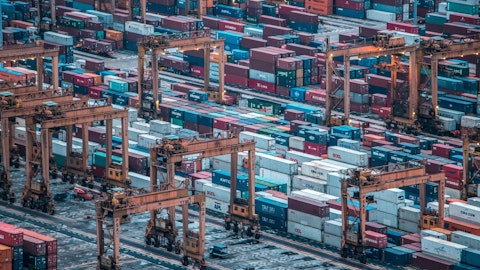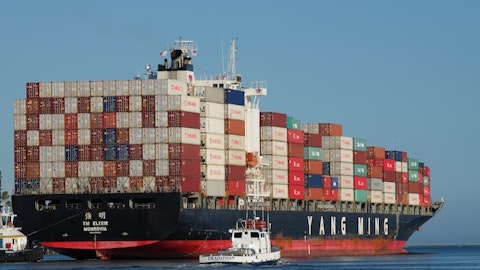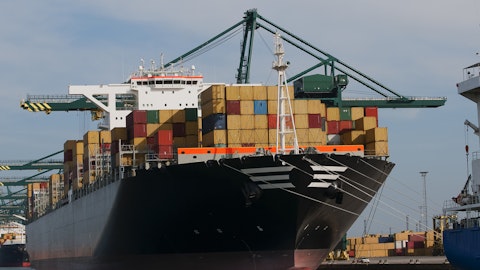Hamish Norton: For Korean or Japanese. Well, basically, we are about a year later. I mean Japan is presently offering mid-2027. For vessels in Korea doesn’t build bulk carriers because they’re occupied with LNG and container and tanker vessels. And I guess China, there are no slots offered for 2025. You can only find slots for 2026. And those are very few and not this quality.
Petros Pappas: And I think second half not 2026, actually not — yes, as you said, very few.
Nathan Ho: Okay, that’s helpful. And Hamish, I think you brought up earlier about the possibility of potentially using mergers as another way of renewing the fleet. Maybe if you wouldn’t mind just expanding a little bit about that, what kind of opportunities you’re seeing and how you’re seeing the market currently?
Hamish Norton: Well, we always see opportunities to buy fleets and much of the time we see the opportunity to use our shares. We only do these transactions if we can use our shares at or above NAV. And frankly, we’re not looking to increase our leverage by any significant amount if we can avoid it. So, we’re a bit sticky. The sellers have been until recently a bit sticky. And it’s been hard to get these things done since the COVID pandemic. Although before COVID, we did about eight of them, I think. The market seems to be turning around a little bit and maybe making it easier to close these transactions. So, I’m hopeful.
Nathan Ho: Great. Thank you so much. That’s really helpful.
Petros Pappas: Thank you.
Operator: Our next question comes from the line of Bendik Folden Nyttingnes with Clarksons Securities. Please proceed with your question.
Bendik Folden Nyttingnes: Yes. Thank you. I think I just wanted to touch return to the market and touch upon some of the ESG aspects. Do you see any impact from factors such as the carbon intensity indicator or the EU ETS system? Do you see that affecting the dry bulk market going into 2024 and beyond with regards to stuff like slow steaming?
Petros Pappas: Well, we think that vessels will probably among the means to have a better CII. I think that vessels will probably also reduce the speed. So, I think that this is going to be beneficial because there’s going to be basically less supply of vessels. So, we consider in this company the environmental regulations as only positive for the shipping industry.
Bendik Folden Nyttingnes: Okay. Thank you. And just a little technical detail at the end, the price point for the options, are those the same as for the firm vessels? And also can you elaborate some on what you would expect the financing to look like if you decide to exercise those?
Nicos Rescos: The option price is exactly the same as the firm vessels. That’s the first part. And we don’t have a lot of cash to pay for the near-term. It’s like $7 million for the two firm vessels, and it would be $7 million for the two optional vessels, and that holds us for a while. So, we’re — we can finance it, frankly, with debt to begin with. It’s not a big deal, and then closer to delivery, we’ll figure out the best way to finance it from the shareholders’ point of view.
Simos Spyrou: Just to clarify, this plus $7 million will not affect our cash balance for the distributable cash for dividends.
Hamish Norton: Yes, exactly. We’re not planning to finance these out of operating cash flow.
Operator: There are no further questions in the queue. I’d like to hand the call back to management for closing remarks.
Petros Pappas: No further remarks, operator. Thank you very much.
Operator: Ladies and gentlemen, this does conclude today’s teleconference. Thank you for your participation. You may disconnect your lines at this time and have a wonderful day.
Petros Pappas: You, too. Thank you very much.
Follow Star Bulk Carriers Corp (NASDAQ:SBLK)
Follow Star Bulk Carriers Corp (NASDAQ:SBLK)
Receive real-time insider trading and news alerts



